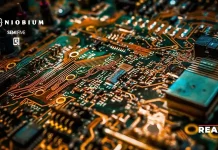NASA has another cargo shipment en route to the International Space Station following a successful Falcon 9 launch of SpaceX’s 27th resupply mission for the agency.
Carrying more than 6,200 pounds of science experiments, crew supplies, and other cargo, the SpaceX Dragon spacecraft was launched to the space station by a Falcon 9 rocket at 8:30 p.m. EDT Tuesday from NASA’s Kennedy Space Center in Florida.
The cargo spacecraft is scheduled to autonomously dock with the space station at 7:52 a.m. EDT Thursday, March 16, and remain at the station for about 30 days. Coverage of arrival will begin at 6:15 a.m. EDT on NASA Television, the agency’s website, and the NASA app.
Also Read: Ball Aerospace Prototype Payload to Provide On-Orbit Data Processing
Among the science experiments Dragon is delivering to the space station for NASA and its partners are:
3D Heart Cells, Tissue
The first Cardinal Heart investigation conducted aboard the space station showed that four weeks of microgravity exposure can cause significant changes in heart cell function and gene expression. Researchers concluded that these changes could lead to long-term medical issues. The Cardinal Heart 2.0 experiment builds on these results, using heart organoids, 3D structures made up of all the different types of cells, to test whether clinically approved drugs reduce these microgravity-induced changes in heart cell function. Results could support the development of effective drug combinations to improve the health of astronauts and patients on Earth.
The Engineered Heart Tissues-2 study continues work with 3D cultured cardiac muscle tissue to assess human cardiac function in microgravity. Previous work with 3D cultures in space detected changes at the cellular and tissue level that could provide early indication of the development of cardiac disease. This investigation tests whether new therapies prevent these adverse spaceflight effects from occurring. The model used in this study has potential use in drug development and other applications related to diagnosing and treating cardiac dysfunction on Earth.
Cardinal Heart 2.0 and Engineered Heart Tissues-2 are the final two experiments comprising the National Institutes for Health and International Space Station National Lab’s Tissue Chips in Space initiative.
SOURCE: PR Newswire




